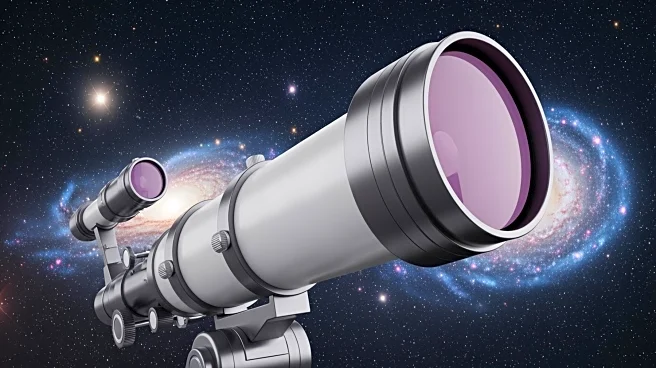What's Happening?
Blue Skies Space, a London-based start-up, is set to launch the Mauve space telescope, marking a significant shift in space research. Mauve is the world's first commercial deep space observatory, designed
to study stellar flares and ultraviolet light to identify stars that could host habitable exoplanets. This initiative represents a departure from traditional government-led space missions, offering a cost-effective and efficient alternative. The telescope aims to provide critical data for astronomers, focusing on the behavior of stars and their impact on surrounding planets. Marcell Tessenyi, CEO of Blue Skies Space, emphasizes Mauve's role in understanding which stars might be harmful or benign for life environments. The telescope's launch is scheduled for 2025, promising new insights into the cosmos.
Why It's Important?
The launch of the Mauve telescope is pivotal for the future of exoplanet research. By focusing on stellar flares and ultraviolet light, Mauve will help scientists identify stars that could potentially host life-supporting planets. This research is crucial as many stars exhibit flare activity, which can render nearby planets uninhabitable. The data provided by Mauve will enable astronomers to pinpoint promising systems for further study, enhancing the efficiency and accuracy of exoplanet exploration. Additionally, Blue Skies Space's innovative business model, which involves selling data through a subscription service, democratizes access to space research, allowing universities and institutions to obtain valuable information without the need for expensive grants.
What's Next?
Following the launch of Mauve, Blue Skies Space plans to continue its efforts in space research with future missions like the Twinkle satellite, which will analyze exoplanet atmospheres. The data from Mauve will guide Twinkle in targeting the most promising systems, further advancing the search for habitable planets. This approach reflects a broader trend in the space industry, where private companies are increasingly filling gaps left by government agencies. As Mauve begins its operations, researchers worldwide will have access to real-time data, potentially leading to groundbreaking discoveries in the field of astronomy.
Beyond the Headlines
The introduction of commercial space telescopes like Mauve highlights a shift towards privatization in space exploration. This trend raises questions about the future role of government agencies like NASA and ESA, as private companies offer more agile and cost-effective solutions. The subscription-based model for data access could democratize space research, but it also poses challenges regarding data ownership and accessibility. As the space industry evolves, ethical considerations around the commercialization of space and the potential monopolization of critical research data will need to be addressed.









